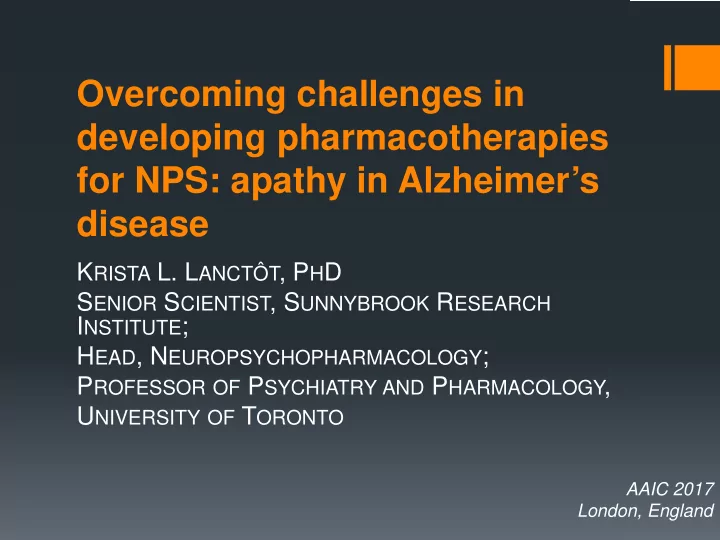

Overcoming challenges in developing pharmacotherapies for NPS: apathy in Alzheimer’s disease K RISTA L. L ANCTÔT , P H D S ENIOR S CIENTIST , S UNNYBROOK R ESEARCH I NSTITUTE ; H EAD , N EUROPSYCHOPHARMACOLOGY ; P ROFESSOR OF P SYCHIATRY AND P HARMACOLOGY , U NIVERSITY OF T ORONTO AAIC 2017 London, England
The possible role of DA Dopaminergic pathways in the midbrain are associated with reinforcement Injury leads to decreased drive and poor initiation Apathy may be associated with dysfunction of the Brain Reward System (BRS) (Mitchell, Herrmann & Lanctôt 2010)
Optimizing treatment of apathy in Alzheimer’s disease 1. Neuroimaging • SPECT shows patients with apathy have alterations in rCBF in crucial areas of the brain reward system Lanctôt et al 2007
Optimizing treatment of apathy in Alzheimer’s disease ARCI Positive Effects Apathetic (n=13) Non-Apathetic (n=7) 450 Composite 200 Baseline 60 min 120 min 180 min 240 min 2. Pharmacologic challenge— • Apathetic patients (n=20) experience fewer positive effects following D-AMPH challenge • Suggests differences in the DAergic system Lanctôt, et al 2008 Supported by the American Health Assistance Foundation
Optimizing treatment of apathy in Alzheimer’s disease 2 0 AES Total NPI Total MMSE -2 -4 -6 -8 Methylphenidate -10 Placebo -12 -14 -16 3. Clinical trial • Pilot data show apathy decreases following methlyphenidate • Supports larger RCT Lanctôt, et al 2008 Supported by the American Health Assistance Foundation
Apathy in Dementia Methylphenidate Trial (ADMET) Double blind, placebo- controlled, 6-week, 3- centre* RCT in 60 patients with AD efficacy and safety of methylphenidate (20 mg/d) for clinically significant apathy in AD *Mintzer, Lanctôt, Rosenberg, Scherer Supported by the National Institute for Aging R01 AG033032-01
ADMET Primary outcomes Mean (SD) 6-week change Odds ratio (95% CI) for in AES scores was -1.9 improvement in CGI-C was (1.5) for methylphenidate 3.7 (1.3, 10.8) (p=0.02) and 0.6 (1.4) for placebo 25% (p=0.23) % moderate or marked improvement on CGIC 20% 15% 10% 5% 0% methylphenidate placebo Rosenberg, et al J Clin Psychiatry 2013
ADMET Secondary outcomes • NPI Apathy score • MMSE trend favouring improvement 1.8 points methylphenidate: (95% CI 0.3, 3.4) greater in estimated difference of 1.5 methylphenidate vs. (95% C.I. -0.1, 3.1) placebo (p=0.02) (p=0.06) Mean (SE) MMSE score Mean (SE) NPI apathy score 25 methylphenidate placebo 15 methylphenidate placebo 20 10 15 5 10 0 5 baseline week 6 change -5 0 baseline week 6 change -10 -5 Rosenberg, et al J Clin Psychiatry 2013
Attention in ADMET 1.4 change in DS forward 1.2 (selective attention) WAIS Digit Span Estimated Change Score 1 forward favoured MPH over 0.8 placebo (δ=0.87 95% CI: 0.06-1.08, p=0.03) 0.6 change in DS total 0.4 MPH (selective attention plus 0.2 PLB working memory) 0 favoured MPH over -0.2 placebo (δ=1.01 [0.09 - -0.4 1.93], p=0.03) -0.6 0 2 4 6 Time (weeks) Lanctôt et al Int Psychogeriatr Feb 2014
Apathy in Dementia Methylphenidate Trial 2 • a phase III randomized multi-center placebo-controlled trial of 6 months 20 mg methylphenidate versus placebo for apathy in Alzheimer’s disease larger trial (n=200) more sites (10) longer duration (6 months) evaluation of QoL and economic impact improved cognitive battery Mintzer, Lanctôt, Rosenberg, Scherer et al Supported by the National Institute for Aging
Recommend
More recommend